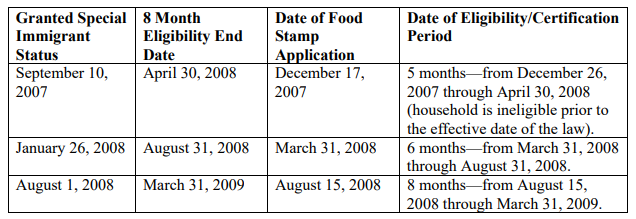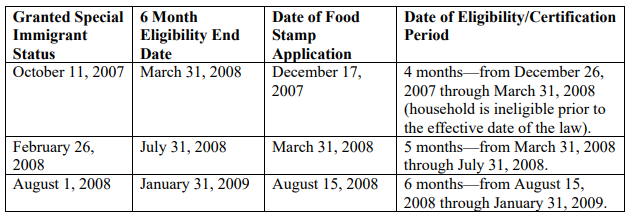| DATE: | March 20, 2008 |
| SUBJECT: | FSP – Guidance on Iraqi and Afghani Special Immigrants |
| TO: | All Regional Directors Food Stamp Program |
In light of recent legislative changes, FNS is issuing the following new guidance on the eligibility of Iraqi and Afghani special immigrants. Due to these changes in legislation, Iraqis are now treated somewhat differently than Afghanis. Because FNS has updated its policy interpretation on how to treat these special immigrants, this new guidance supersedes our previous guidance on Iraqi and Afghani Special immigrants issued on Jan. 24, 2008. States that discover or become aware of any Iraqi and Afghani special immigrants who were denied prior to the passage of these laws should reconsider those denials using this current policy.
Iraqi Special Immigrants
Although Iraqi special immigrants were also eligible under PL 110-161 of The Consolidated Appropriations Act of 2008, PL 110-181, The National Defense Authorization Act for Fiscal Year 2008 (that includes Section 1244, Special Immigrant Status for Certain Iraqis), effectively extended program eligibility to affected Iraqi aliens for a period not to exceed eight months. This provision became law on Jan. 28, 2008, and is in effect for five fiscal years, for FY 2008 through FY 2012. FNS will notify interested parties if this provision is not extended or if there are any changes in the law that affect the eligibility of Iraqi special immigrant households.
Afghani Special Immigrants
Effective Dec. 26, 2007, PL 110-161, The Consolidated Appropriations Act of 2008, granted certain Afghani aliens special immigrant status under section 101(a)(27) of the Immigration and Nationality Act (INA). Adult individuals and family members granted this special immigrant status are eligible for resettlement assistance, entitlement programs, and other benefits to the same extent as are refugees admitted under section 207 of the INA, except the period of eligibility cannot exceed six months.
Verification of Special Immigrant Status
Iraqi and Afghani aliens and family members who claim special immigrant status must provide verification that they have been admitted under section 101(a)(27) of the INA. States may access Office of Refugee Resettlement (ORR) policy for examples of acceptable documentation of immigrant status, through ORR's State Letters #08-04 and #08-06 at: http://www.acf.hhs.gov/programs/orr/policy/stltrs08.htm. This provision is part of an appropriations bill and is in effect through the end of the fiscal year (September 30, 2008). Nonetheless, historically such appropriation bills remain in effect after the end of the fiscal year through continuing resolutions and we anticipate that it will be extended. State agencies will not have to truncate the household's certification period to coincide with the end of the fiscal year. FNS will notify interested parties if this provision is not extended or if there are any changes in the law that affect the eligibility of Afghani special immigrant households.
Date of Eligibility
The effective date of eligibility for both Iraqi and Afghani special immigrants can be no earlier than Dec. 26, 2007 (under PL 110-161). We are also clarifying that both Iraqi and Afghani special immigrants will either enter the U.S. as Lawful Permanent Residents (LPRs) with the special immigrant visa or will adjust to special immigrant status after entering the U.S. under another immigration status (such as an asylee or parolee). This means that unless the immigrant is a qualified alien and is eligible under current program rules, the date of eligibility for adult Iraqi and Afghani special immigrants will depend on when the individual has been granted special immigrant status. Thus the beginning date for eligibility may or may not coincide with the special immigrant's date of entry. Moreover, Iraqis and Afghanis who entered the U.S. as special immigrants or who adjusted to that status before Dec. 26, 2007, may not be eligible for the full 8 or 6 months of benefits.
For example, asylees are qualified aliens and are eligible under current program rules. Even if the asylee later adjusts and becomes a special immigrant, the six or eight month time limit would not apply. (See 7 CFR 273.4(a)(5)(iii).)
In another example, aliens who are paroled into the U.S. for one year are qualified aliens and would be eligible for food stamps after five years or by meeting another condition. If the parolee later adjusts to special immigrant status, the period of eligibility would begin from the date the special immigrant status is approved, and the six or eight-month time limit would apply.
The Iraqi and Afghani special immigrant time limits do not apply to qualified alien children under 18, who are eligible under normal program rules until they reach the age of 18. It is critical that eligibility workers carefully examine the immigration documents of Iraqi and Afghani special immigrants and their family members to ensure that appropriate policies are applied to all household members.
Certification Periods and Time Limits
Although we have given examples of certification periods below, a state agency may assign normal certification periods for both Iraqi and Afghani special immigrant households if its data system can track and remove individuals from benefits automatically as their time limit expires, which would be appropriate if there are other members in the household who remain eligible. When the household reapplies at the end of its certification period, the state agency must re-determine eligibility based on the immigration status of each household member. Because adult Iraqi and Afghani special immigrants can only receive, respectively, up to 8 or 6 months of food stamp benefits, states must develop procedures to assure that these household members do not receive any more than the appropriate months of benefits allowed under the law.
Iraqi Special Immigrants
Adult Iraqi special immigrants can receive up to eight months of food stamps from the date they are granted special immigrant status. Because most adult Iraqi special immigrants will apply sometime after they have been granted status, the period of eligibility could be eight months or less, as the following illustrates:
Afghani Special Immigrants
Adult Afghani special immigrants can receive up to six months of food stamps from the date they are granted special immigrant status. Because most adult Afghani special immigrants will apply sometime after they have been granted status, the period of eligibility could be six months or less, as the following illustrates:
Quality Control Review Procedures
A 120-day variance exclusion period is in effect for implementation of the revised guidance on Iraqi and Afghani Special Immigrants. The variance exclusion period is effective 30 days from the date of this guidance memo and continues for 120-days from that date. If a state implements the revised guidance prior to 30 days from the date of this guidance memo, the 120-day variance exclusion period begins on the date of the state agency's implementation and continues for 120 calendar days from that date. If the state agency's implementation is later than 30 days from the date of this guidance memo, the variance exclusion will begin on the date of implementation and end on the date 120 days from the date which is 30 days after the date of this guidance memo, regardless of the date of implementation.
Any variances related to the treatment of Iraqi and Afghani special immigrants that occur, beginning with implementation of this guidance memo or 30 days from the date of this guidance memo, as appropriate, in cases that are new applications, recertified or have changes made during the applicable part of the 120-day variance exclusion will be excluded until the case is recertified.
Cases that have Iraqi and Afghani special immigrants will not have variances associated with the treatment of Iraqi and Afghani special immigrants included for quality control (QC) error determination purposes beginning with Dec 26, 2007, the effective date of PL 110-161, until 30 days from the date of the guidance memo. If a state agency implements the guidance prior to 30 days from the date of the guidance memo, the 120-day variance exclusion in the above paragraph takes effect at that point.
Coordination with Refugee Agencies
State agencies can work with or contact their respective State Refugee Coordinator's Office at http://www.acf.dhhs.gov/programs/orr/partners/state_coordina.htm if they have additional questions regarding ORR policy as it relates to Iraqi and Afghani special immigrants.
State agencies that have questions regarding this guidance should contact their respective regional office representative. Regional office staff who have questions regarding this guidance should contact their respective liaison in the Certification Policy Branch.
Arthur T. Foley
Director
Program Development Division



